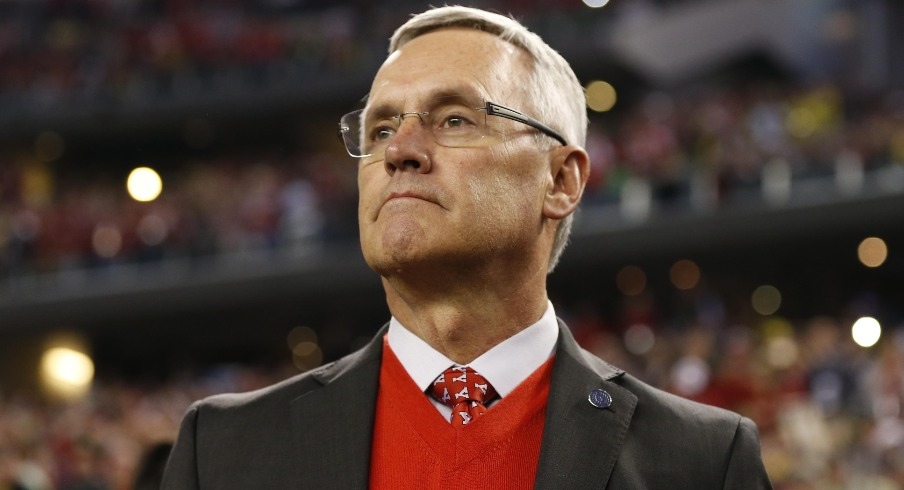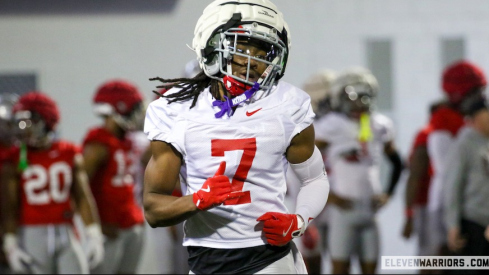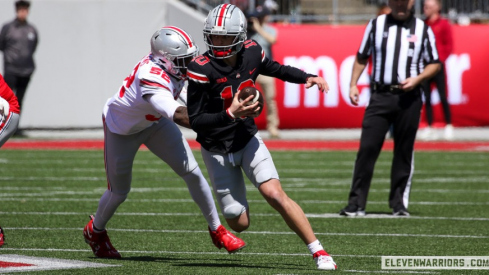Jim Tressel will never forget it.
Within days of his resignation from Ohio State in May of 2011, Tressel recalls driving down Riverside Drive in Columbus when his phone rang. But perhaps unlike at any point during his 10-year career as head coach of the Buckeye football team, an incoming call didn’t cause Tressel’s stomach to knot up.
“Normally, when my phone rang, something was up,” Tressel said on Chris Holtmann’s More Than Coach Speak podcast last week. “It was the first time in a long time that when my phone rang, I wasn’t thinking, ‘Oh my gosh, I wonder what happened.’ So there was a liberating part of it.”
That moment may have represented a silver lining after a tumultuous period. However, there were still plenty of dark times to come for Tressel following the end of his tenure with the Buckeyes. Over a few months, Tressel went from leading one of the top college football teams in the country – fresh off a stellar 12-1 season in 2010 – to being embroiled in an NCAA investigation that led to his abrupt exit from the program.
The infamous scandal surrounded Tressel’s knowledge of multiple Buckeyes receiving improper benefits from a local tattoo shop. First suspended for two games of the 2011 season, the punishment escalated to a five-game suspension and a $250,000 fine before Tressel paid the ultimate price. Ohio State kept paying after that, as the Buckeyes saw their wins from the 2010 campaign vacated by the NCAA, which placed the program on three years probation and made the team serve a postseason ban in 2012 – a year in which the Buckeyes went 12-0 in the regular season.
In the modern age of NIL, the Tressel turmoil appears overblown retrospectively, and the punishment hardly seems to fit the crime. After winning a national championship, appearing in another, notching six Big Ten titles and beating Michigan nine times in 10 tries, many think Tressel should have earned a longer leash. It was only natural that Tressel fought feelings of resentment, and he said a portion of those “chirping” in his ear tried to spur on those emotions.
Instead of letting such thoughts fester, Tressel opted to practice what he had long preached to his players about battling through tough times.
"We had been talking to our players for 25 years that I was a head coach about it’s not If adversity happens, it’s when. And really, you’re gonna be marked based upon how you handle that."– Jim Tressel on Handling OSU Exit
“It was hard. It was harder on my family than it was on me. Because that’s just the way things usually are,” Tressel said. “Just like when you lose a game, it’s harder on your family than it is on you. You know why you lost the game; we had too many turnovers, we didn’t rebound, they shot too well, whatever. But it’s really hard, and harder now with the amount of media. Just like the first thing we talked about with why it’s harder on the players is because of all that media, well, the same thing happens. It’s harder on the families, and everyone’s got an opinion, and there are millions of them expressing it.
“Like anything else, we had been talking to our players for 25 years that I was a head coach about it’s not if adversity happens, it’s when. And really, you’re gonna be marked based upon how you handle that because we all are gonna have adversity, so you better have something that you hold on to that’s bigger than you and stronger than the adversity and can drown out those voices that love to talk about it.”
So, what would Tressel do next? Surely, given his credentials and accomplishments at Ohio State, he could eventually transition to another high-profile position in the college ranks, if not pursue an opportunity at the next level. But Tressel wanted to remove himself from the sport for a while and set a goal to read 100 books, none on athletics, to “see if there was something else.”
After all, Tressel said Ohio State was “kind of the pinnacle” of the coaching profession for a Buckeye State native, and his decade-long run at the helm of the program was no insignificant amount of time. But Tressel said he only got through 32 books before receiving a call from the NFL.
“Coach (Jim) Caldwell from the Indianapolis Colts called me, one of the finest human beings in the world, and asked if I would come and consult,” Tressel said. “They’d lost Peyton Manning, and he said, ‘We’re probably not gonna win any games but let’s try,’ … And so I spent some time there, and that’s when I realized I wanted to be in education. I didn’t think professional athletics was really education. It was business. You’d be sitting there, and every Wednesday, there’d be six people gone and six new people and you’d plug them into special teams. It was just a different world.
“And that’s when I started to think education would be something that might be a good next step because it’s hard to beat an (Ohio State head coaching job). And I had been a head coach for 25 years. It’s not like I didn’t get a chance to do it for a while. And I had coached for 37 years. So we thought it was a good time to look at something different.”
Tressel moved into collegiate administration in 2012, returning to the school at which started his coaching career (Akron) in a role as vice president of strategic engagement. By May of 2014, Tressel was hired as president at Youngstown State, where he previously spent 15 years as head coach of the Penguin football program before being hired by Ohio State in 2001. Tressel spent nearly an entire decade at YSU before stepping down from his post this past February.
While Tressel had to adapt to a markedly different environment than the football field, he said, “It was as tough and challenging and rewarding as coaching, without a doubt.”
“I don’t think it was a different skill set. It was a different language. It was a different information set,” Tressel said. “Fortunately, we got to come through the University of Akron for two years as a vice president and really go to school on higher ed and realize that the skill sets were similar, but there was a lot you needed to learn. Because you had to be able to speak that language, and the breadth of it was so much larger. … But the skill set, the relationship-building, the listening, the work ethic, the surrounding yourself with good people who are willing to work together (were all similar).
"And it’s much harder at a university level because the engineering college isn’t that interested in the theater arts group. They want their budget. Whereas in sports, offense, defense and special teams better appreciate each other because they have such an impact on each other. But it was a great experience.”
Despite the fallout from the end of his Ohio State career, Tressel remains a beloved figure to Buckeye fans, many of whom turned up to commemorate the 20th anniversary of the Buckeyes’ 2002 national championship team in a special event hosted by Eleven Warriors ahead of the 2022 season opener. Tressel also returned to campus to join Ryan Day, Urban Meyer and John Cooper on stage for an April roundtable discussion at Ohio State’s annual coaches clinic.
Tressel quoted the words of another former Ohio State head coach, Earle Bruce – who hired him as a position coach with the program in 1983 – to describe the mentality that helped carry him through the toughest stretch of his professional career with remarkable grace.
“Coach Bruce used to always tell us, ‘You don’t ever want to go into the street with a melee. You always want to be on the high road.’ And it’s not easy. That’s not always an easy road always either,” Tressel said. “But I think the test of time, that’s the best road, as painful as it might be while you’re on that high road. But we used to talk to our team all the time, win or lose you gotta do it with class. That’s what’s most important.”


